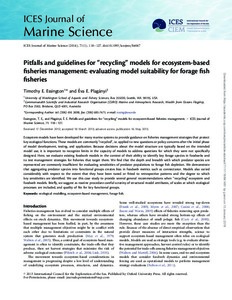| dc.contributor.author | Essington, Timothy E. | |
| dc.contributor.author | Plagányi, Éva E. | |
| dc.date.accessioned | 2019-01-10T23:21:42Z | |
| dc.date.available | 2019-01-10T23:21:42Z | |
| dc.date.issued | 2014 | |
| dc.identifier.citation | Essington, T. E. and Plagányi, É. E. (2014) Pitfalls and guidelines for “recycling” models for ecosystem-based fisheries management. ICES Journal of Marine Science, 71, pp.118-127. DOI: 10.1093/icesjms/fst047 | en_US |
| dc.identifier.uri | http://hdl.handle.net/11329/651 | |
| dc.identifier.uri | http://dx.doi.org/10.25607/OBP-209 | |
| dc.description.abstract | Ecosystem models have been developed for many marine systems to provide guidance on fisheries management strategies that protect key ecological functions. These models are commonly “recycled”, i.e. applied to new questions or policy concerns after the initial phase of model development, testing, and application. Because decisions about the model structure are typically based on the intended model use, it is important to recognize limits in the capacity of models to address questions for which they were not specifically designed. Here, we evaluate existing foodweb models in the context of their ability to identify key forage species in foodwebs and to test management strategies for fisheries that target them. We find that the depth and breadth with which predator species are represented are commonly insufficient for evaluating sensitivities of predator populations to forage fish depletion. We demonstrate that aggregating predator species into functional groups creates bias in foodweb metrics such as connectance. Models also varied considerably with respect to the extent that they have been tuned or fitted to retrospective patterns and the degree to which key sensitivities are identified. We use this case study to provide several general recommendations when “recycling” ecosystem and foodweb models. Briefly, we suggest as routine procedure careful scrutiny of structural model attributes, of scales at which ecological processes are included, and quality of fits for key functional groups. | en_US |
| dc.language.iso | en | en_US |
| dc.subject.other | Ecological modelling | |
| dc.subject.other | Ecosystem-based management | |
| dc.title | Pitfalls and guidelines for “recycling” models for ecosystem-based fisheries management: evaluating model suitability for forage fish fisheries. | en_US |
| dc.type | Journal Contribution | en_US |
| dc.description.refereed | Refereed | en_US |
| dc.format.pagerange | pp.118-127 | en_US |
| dc.identifier.doi | https://doi.org/10.1093/icesjms/fst047 | |
| dc.subject.parameterDiscipline | Parameter Discipline::Biological oceanography::Fish | en_US |
| dc.bibliographicCitation.title | ICES Journal of Marine Science | en_US |
| dc.bibliographicCitation.volume | 71 | en_US |
| dc.bibliographicCitation.issue | 1 | en_US |
| dc.description.sdg | 14.2 | en_US |
| dc.description.eov | Fish abundance and distribution | en_US |
| dc.description.bptype | Guide | en_US |
| obps.contact.contactemail | essing@uw.edu | |
| obps.resourceurl.publisher | https://academic.oup.com/icesjms/article/71/1/118/641481 | en_US |
 Repository of community practices in Ocean Research, Applications and Data/Information Management
Repository of community practices in Ocean Research, Applications and Data/Information Management
